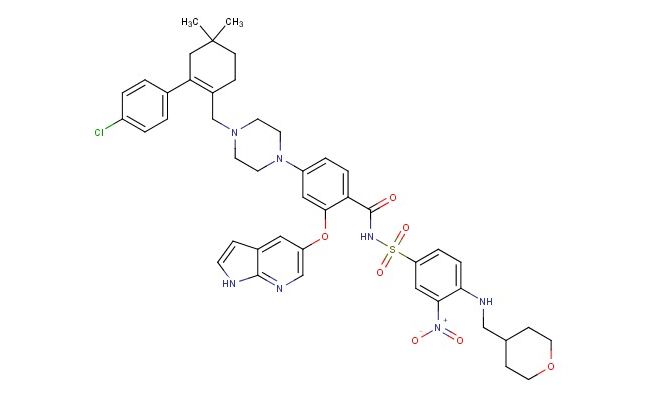Venetoclax; ABT-199; ABT 199; GDC-0199
$100.00
CAS No.: 1257044-40-8
Catalog No.: 105148
Purity: 95%
MF: C45H50ClN7O7S
MW: 868.457
Storage: 2-8 degree Celsius
SMILES: CC1(C)CCC(CN2CCN(CC2)C2=CC=C(C(=O)NS(=O)(=O)C3=CC=C(NCC4CCOCC4)C(=C3)[N+]([O-])=O)C(OC3=CN=C4NC=CC4=C3)=C2)=C(C1)C1=CC=C(Cl)C=C1
Catalog No.: 105148
Purity: 95%
MF: C45H50ClN7O7S
MW: 868.457
Storage: 2-8 degree Celsius
SMILES: CC1(C)CCC(CN2CCN(CC2)C2=CC=C(C(=O)NS(=O)(=O)C3=CC=C(NCC4CCOCC4)C(=C3)[N+]([O-])=O)C(OC3=CN=C4NC=CC4=C3)=C2)=C(C1)C1=CC=C(Cl)C=C1
CAS NO.: 1257044-40-8; 2-((1H-Pyrrolo[2,3-b]pyridin-5-yl)oxy)-4-(4-((4'-chloro-5,5-dimethyl-3,4,5,6-tetrahydro-[1,1'-biphenyl]-2-yl)methyl)piperazin-1-yl)-N-((3-nitro-4-(((tetrahydro-2H-pyran-4-yl)methyl)amino)phenyl)sulfonyl)benzamide (Venetoclax; ABT-199; ABT 199; GDC-0199). PROPERTIES: Venetoclax is a white to off-white crystalline solid with a molecular weight of approximately 959.1 g/mol. It is practically insoluble in water but exhibits solubility in organic solvents like dimethyl sulfoxide (DMSO) and ethanol. The compound should be stored at room temperature in a tightly sealed container, protected from light and moisture to maintain stability. As a BCL-2 inhibitor, it requires careful handling: wear gloves and a lab coat to prevent skin contact, and avoid inhalation of dust, as it may pose health risks. APPLICATIONS: Venetoclax, also known as ABT-199 or GDC-0199, is a targeted therapeutic agent used in oncology. It selectively inhibits the BCL-2 protein, a key regulator of apoptosis, thereby promoting programmed cell death in cancer cells. Approved for treating chronic lymphocytic leukemia (CLL) and acute myeloid leukemia (AML), Venetoclax disrupts the survival mechanisms of cancer cells that overexpress BCL-2. Clinical applications rely on its ability to induce remission by overriding apoptotic resistance. This use is supported by clinical trial data and regulatory approvals, as documented in oncology literature and pharmaceutical guidelines.
Reviews
Write Your Own Review





